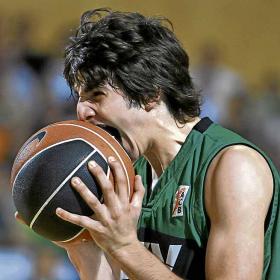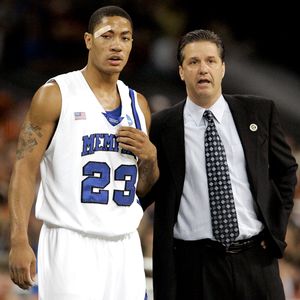If there's one thing that sports routinely gives us, it's heroes.
We see Willis Reed limping onto the court in the 1970 NBA finals to inspire the Knicks to victory. We see Lance Armstrong beating cancer and conquering the Tour De France. We see Roberto Clemente dying tragically in a plane crash while on his way to deliver aid to earthquake victims.
We see all these things, and in our minds, they become heroes for their efforts. They sacrifice themselves and their well-being for the good of a team, or a city, or a the fans. In the minds of fans, the heroes' actions represent something more than just a game, something that speaks to the human spirit.
Sports at its essence is entertainment, and the creation of heroes in sports is an extension of the storytelling and mythmaking that accompanies the games. If fans are to devote their minds and their hearts to sports, then having heroes to cheer on makes it even more worthwhile.
But today, real sports heroes are hard to come by. Except for the wonderful exceptions like Armstrong, most of the athletes that pass for heroes are all the same: they play a game, they're good at it, they don't say anything bad in the press, rinse, repeat. Guys like Derek Jeter, Tom Brady, and LeBron James may be great athletes and good people, but from a storytelling, entertainment standpoint, there's nothing really heroic about about them.
It's so ... boring.
What's needed then, is a foil for these so-called heroes. Something to spark the heroic nature of others. Something that polarizes the sports world.
We need villains.
Sports is in need of a really evil villain, someone who is despised by all and loves that fact. We need someone really diabolical, whose actions and words inspire a sense of conflict and compels the heroes go against him. We need someone who lies, cheats, backstabs, and does it all with a smile on his face.
Good vs Evil. Right vs Wrong. Heroes vs Villains. It's what sports need.
The entertainment aspect of sports is all about creating a narrative, and the way to do that is to frame sports as a clash between two sides, which often means our favorite team is "good" and the opponent is "bad." But where is the drama? A team cannot simply be good or bad just because we say so. I want to see a real conflict, where fans can actually see the good guys become heroes. And you can't have a hero without a villain.
The problem is, sports needs a real villain, someone who is really evil, and unfortunately, the athletes who have been labeled as quasi-villains at the moment don't really fit the bill.
Michael Vick did some horrible things, but players and many fans genuinely like him and think he's repented. Alex Rodriguez cheated, but is more of a pompous prima donna than a real villain. And at the same time, it needs to be someone big, who is in the spotlight regularly. Some scrub on the bench or a corrupt, faceless executive won't do it.
No, we need someone really devious. Someone who will makes fans think "we need someone to stand up and stop this guy!"
It's all about drama. With a real villain in the sports world, no one would ever have to make an issue bigger than it really is simply to inflate the sense of drama and entertainment. There would be less media posturing, less sensationalism and less vilifying of athletes who don't deserve it. A real villain would be a bad guy, and he would revel in that fact. We need someone who doesn't give a damn about others, and is willing to use any means necessary to benefit himself.
So is there anyone out there in the sports world who has what it takes? Is there someone who has the cunning, the attitude, and the power be an effective bad guy?
We've got options.
Brett Favre. The farmboy that everybody admired turned his back on the city that loved him, joining with a purple-clad rival. If he were to come out and say that Green Bay is an awful city and he's glad he left, the transformation to the dark side would be complete. Not only would people already be sick of his lying and un-retiring, now everyone else would turn against him and make the defeat of his powerhouse Vikings the main goal.
Kobe Bryant. We've all heard about his clashes with teammates and coaches, his solitude, and his unrelenting, everyone-else-be-damned pursuit of another championship ring to prove his worth. This guy has all the ingredients of a classic villain! All he has to do is stop pretending to like his teammates and stop forcing a false persona upon us and he'd be perfect.
Clay Bennett. The man hijacked the Seattle Sonics despite vehement protests and moved them halfway across the country to Oklahoma City (forcing his team to play there should be reason enough for villainy). The e-mails that revealed he was planning something like that all along is further evidence. Some public, anti-Seattle comments would be enough to turn the NBA against him and start an effort to save the Thunder from their horrible plight in OKC under his tyrannical rule. And if David Stern admits to being in on it, we could have a Vince McMahon, corrupt CEO situation on our hands. Even better!
One or both of the Williams sisters. If both are evil, it creates an unstoppable duo. If it's just one of them, then we get the family-struggle.
Michael Phelps. Just to mess with people. Wouldn't it be the ultimate shock if Phelps turned heel on us?
With a few villains around, things always get a little more interesting.
Villains inspire heroes. There's no Batman without a Joker. There's no Spider-Man without an uncle-murdering burglar. There's no Luke Skywalker without Darth Vader. There are no heroes without villains. I think it's about time the sports world embraced this concept to bring a new level of conflict and drama to the table.
It's the most basic and enduring element of storytelling: the good guys vs the bad guys. The sports world is all about storytelling, too, that's why you see so many bland personality profiles of athletes. It's done in an effort to give personalities to athletes, to make them more than faces, to try to find characters. But in any good story, a character remains flat if there isn't anything to test his resolve or something that inspires him to change. In stories, there's usually one thing that sparks that transformation.
Imagine the character development we'd see when the villains get involved.
















